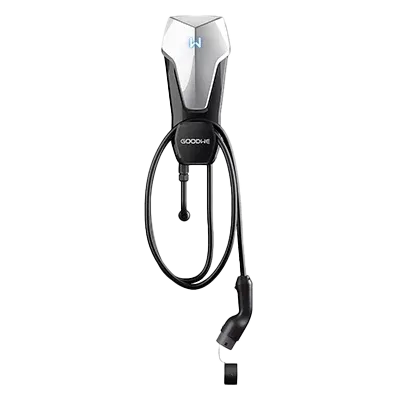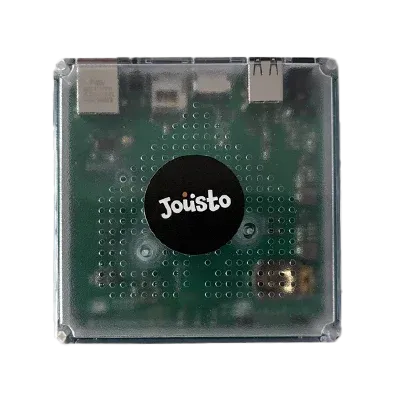
GoodWe EV Charger 7kW
Single-phase AC charger (IP66), perfect for most Aussie homes. Pair with Energy Hub for solar-aware charging.
Choose a charger, add the Jousto Energy Hub to charge from sunshine and cheap off-peak power, then book installation. Simple, smart, and ready for every EV.

Quality hardware, great value — and smarter with the Jousto Energy Hub.

Single-phase AC charger (IP66), perfect for most Aussie homes. Pair with Energy Hub for solar-aware charging.

Faster AC charging for three-phase homes and EVs that support higher rates. Solar-smart with Energy Hub.

Make charging solar-aware on day one. Includes Genius Agent to guide your self-setup & automations.
Learn more about the Jousto Home Assistant Genius.
Choose your charger
Pick 7kW or 22kW GoodWe model.
Add the Energy Hub
$249 with Genius Agent for self-setup.
Checkout online
We’ll confirm details and schedule install.
Charge on sunshine
Smart modes for solar and off-peak.

South Australia has established itself as one of the country’s most solar-savvy states, with thousands of households investing in renewable energy. Yet, despite the widespread uptake, many homeowners still approach solar power through the lens of price-first thinking. Standard solar quotes—while useful as a starting point—often gloss over the deeper, more valuable aspects of a high-performing solar system.
This guide reveals the often-overlooked components of a smart solar setup: from inverter types and battery storage, to grid connection nuances, hidden costs, and future-proofing strategies. Whether you're a first-time buyer or upgrading an existing system, understanding what standard quotes miss will help you make a confident, informed decision.
Most initial solar quotes in South Australia include:
Number of panels, their wattage, brand, and model
System size in kilowatts (kW)
Inverter brand and model
Post-rebate cost (factoring in STCs)
Basic installation costs
Warranty on parts and sometimes workmanship
A rough mention of feed-in tariffs (FiTs)
These quotes are designed to provide a quick estimate—often just enough to pique your interest.
However, key components that significantly affect the efficiency, savings potential, and usability of your system are often missing, such as:
Panel orientation and tilt specifics
Type and strategic selection of inverter (hybrid vs. standard)
Battery integration potential and VPP opportunities
Real-time monitoring (especially consumption monitoring)
South Australia–specific grid connection rules and export limitations
Additional installation costs (roof upgrades, switchboards, etc.)
Customised self-consumption advice
Future scalability and smart home compatibility
In Adelaide, north-facing solar panels at a 35° tilt are generally ideal, matching the city’s latitude. But quotes rarely address whether your home’s roof pitch, orientation, and shade profile require customisation.
For example, east-west orientations can provide a flatter generation curve, which is great if you use more electricity in the mornings and evenings. Quotes that ignore your usage patterns and property layout miss the opportunity to tailor your system for maximum daily efficiency.
Always ask:
What direction will my panels face?
How does this match my power usage habits?
Inverters are more than just a DC-to-AC box. They:
Determine energy conversion efficiency
Influence how the system integrates with batteries
Impact monitoring capability
Affect system longevity
A hybrid inverter is essential if you want the option to add a battery later. Premium inverters like Fronius or SMA tend to last longer and include better warranties, while budget options may reduce upfront costs but risk earlier failure.
Ask your installer:
Is the quoted inverter hybrid-ready?
Why was this brand and model chosen?
What is the efficiency rating and warranty period?
A battery can:
Store solar energy for use at night
Reduce grid reliance
Improve blackout protection
Potentially earn revenue through Virtual Power Plants (VPPs)
In South Australia, programs like the Home Battery Scheme (if active) can help offset costs. However, many quotes don’t explain the financial pros and cons of batteries—especially payback periods and VPP trade-offs (like reduced battery lifespan or limited control over energy use).
Consider asking:
What battery sizes and brands are available?
What’s the expected ROI based on my usage?
Will I be enrolled in a VPP? If so, how does it work?
Monitoring is often oversimplified in quotes. While most systems include basic solar production monitoring, the real value lies in consumption monitoring—which shows how and when you use power.
Benefits of advanced monitoring:
Spot performance issues early
Shift usage to maximise solar savings
Track battery behaviour in real time
Improve return on investment through behavioural changes
If consumption data isn’t included, ask for an upgrade. It's one of the easiest ways to make the most of your solar system.
South Australia has unique rules around grid connections. SAPN currently uses flexible exports, allowing up to 10kW per phase—but only if your home has a reliable internet connection.
If you can’t meet these requirements, you may be restricted to just 1.5kW per phase, significantly reducing your ability to earn from excess solar.
Key questions to ask:
Will I qualify for flexible exports?
What’s the maximum inverter size for my property?
Are there internet requirements I need to meet?
Understanding these grid rules is crucial for accurate savings estimates.
Solar quotes often focus on the "best case" base price. However, many homes require additional work, including:
Roof repairs or reinforcements
Switchboard upgrades or rewiring
Smart meter installation
Special racking systems for tile or Kliplok roofs
Council permits or heritage restrictions
Internet upgrades for monitoring or flexible exports
Additional installation labour in multi-storey or steep-roof homes
Battery installation costs not included upfront
Ongoing maintenance or cleaning costs
Be sure to ask:
Are there any extra installation requirements for my roof or switchboard?
Will I need a smart meter or new internet hardware?
Are future service or monitoring subscriptions needed?
In 2025, most SA feed-in tariffs range from 5.5c to 11c/kWh, with reduced rates for larger exports. In contrast, the electricity you don’t buy from the grid saves you up to 35–40c/kWh.
Strategies to boost self-consumption:
Run washing machines, dishwashers, and pool pumps mid-day
Use smart timers and home automation tools
Install electric hot water or heat pump systems
Charge electric vehicles during daylight
Use battery storage to shift power to evenings
Leverage smart systems like Jousto to automate appliance use
Most quotes don’t include self-consumption advice—yet it’s the #1 driver of return on investment.
Your energy needs will likely grow. Think:
Electric vehicles
Smart appliances
More occupants or larger homes
Price increases for grid power
New tech like AI-driven energy automation
To future-proof your system:
Slightly oversize your panel array
Choose a hybrid inverter
Opt for quality components with 10–25 year warranties
Ask about smart home compatibility
Ensure the system is modular and scalable
Investing with tomorrow in mind reduces future costs and ensures your system remains relevant and efficient.
To make sure you're seeing the full picture:
What direction and tilt will my panels be installed at, and why?
Is the inverter hybrid? What brand and efficiency does it offer?
What battery options are available, and are any government rebates still active?
Will I be part of a Virtual Power Plant (VPP)? What are the pros and cons?
Does monitoring include consumption data? Can it be upgraded?
What export limits will apply to my home, and will I need internet upgrades?
Are there extra costs for my roof type, switchboard, or location?
What’s your advice for increasing my self-consumption?
How easy is it to expand or upgrade this system later?
Are you CEC-accredited, and what’s the workmanship warranty?
In the rush to "go solar", it’s easy to be swayed by the cheapest quote. But when it comes to long-term value, knowledge is power. A truly optimised solar system is one that fits your home, your lifestyle, and your future goals.
By asking the right questions and understanding what standard solar quotes may leave out, South Australian homeowners can unlock deeper savings, greater energy independence, and peace of mind for years to come.
Don’t just settle for a solar system—choose a smarter one.
While choosing the right solar panels and inverter is crucial, what you do with your solar power after installation is where the real value lies. That’s where Jousto steps in—offering powerful, automated energy management tools that go well beyond what’s covered in most solar quotes.
Most basic solar systems only show what your panels are producing—not how you're using that power. Jousto provides detailed, real-time insights into both solar generation and household energy consumption, down to the appliance level. This allows you to:
Spot inefficient devices or high-consumption habits
Adjust behaviour to use more solar when it’s available
Verify that your system is performing as promised
Jousto doesn’t just track your energy—it automates it. Their platform connects with smart appliances, allowing you to:
Schedule heavy-use appliances like dishwashers or pool pumps to run when solar output is highest
Automatically adjust usage based on wholesale electricity pricing (ideal if you're on time-sensitive tariffs)
Optimise solar + battery combinations for greater independence from the grid
This automation is particularly valuable in South Australia, where electricity rates fluctuate and feed-in tariffs are modest compared to the cost of grid power.
With Jousto, instead of sending excess energy back to the grid for just a few cents per kWh, you can redirect that power to where it saves you the most. That might be:
Heating water
Charging an electric vehicle
Pre-cooling your home
Powering appliances at strategic times
It’s like having a solar-savvy energy manager in your pocket.
Unlike one-time installers, Jousto stays with you long after your panels are up. Their tools help homeowners:
Fine-tune performance over time
Adapt to changing usage patterns
Easily expand or integrate new tech (like EV chargers or home batteries)
Track long-term energy savings and payback progress
Most solar quotes focus on equipment and installation—but Jousto focuses on outcomes: lower bills, higher efficiency, and smarter power use. Especially if your quote lacks self-consumption strategies or detailed monitoring, Jousto fills that gap with intelligent, automated control.
Don’t let your solar investment stop at installation. Whether you're looking to automate energy usage, maximise self-consumption, or future-proof your setup, Jousto offers the smart tools and support to make it happen.
Want someone to manage it all for you? Jousto’s “Do It For Me” service handles setup, optimisation, and monitoring—so you can save more without lifting a finger.
👉 Let Jousto do it for you
Prefer to take control yourself? The Jousto platform empowers you with real-time data, intelligent automation, and appliance-level insights.
👉 Explore how Jousto works
With Jousto, you're not just going solar—you’re going smarter.

© Copyright 2025.Honen Lead Generation.
All Rights Reserved.
Phone: 0489 261 333
185 Morphett St, Adelaide, SA, 5000